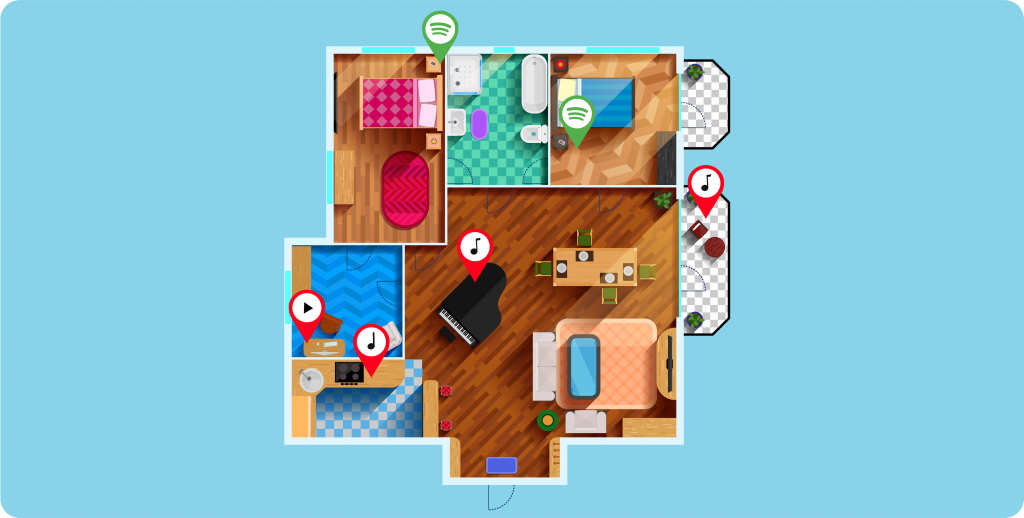You are enjoying your favorite rock band in the living room, your wife is solitarily listening to her R’n’B in the kitchen, while the kids are pretty comfortable in their bedrooms with the Disney radio. Yeah, that’s the kind of the future we wouldn’t mind.

written by:
Anton Rykov
Product Manager, Qulix Systems
You are enjoying your favorite rock band in the living room, your wife is solitarily listening to her R’n’B in the kitchen, while the kids are pretty comfortable in their bedrooms with the Disney radio. Yeah, that’s the kind of the future we wouldn’t mind.
Wandering around the house and being able to control the music in each room from a smartphone used to be a futuristic idea, but over the recent years, the market for multiroom audio systems has boomed. The wireless revolution came along, and people no longer need to constantly move equipment around or do the wiring through the house.
Internet of Things devices represent an extremely diverse technology, transforming all spheres from regular consumer devices to large-scale manufacturing. No wonder its grip on smart home systems is very tight, as media and entertainment services are an integral part of our daily lives and this consumer sector is very promising. The Internet of Things technology has all the potential to become a huge hit in the years to come, thanks to the increasing availability of broadband internet enhanced by the upcoming introduction of 5G technologies.
Smart and smarter
The concept of Smart Home covers a variety of components such as video surveillance, smart lighting, energy management, multiroom systems, etc.
Multiroom is a system for distributing and transmitting video or audio signals from reproducing devices to television panels or speakers located in different parts of the house.
Audio Multiroom is a younger brother of Video Multiroom. As it goes from its name, the former is a concept of unified control over audio devices around the house with no special link to a single sound source. Sound can be sent from any possible source, be it your smartphone, discs, TV, game console, memory stick, different internet radio stations and online subscription services like Spotify or iHeart. What is more, such well-known market player as Yamaha extended this functionality even further and created the opportunity for hardcore fans of “old good” vinyl sound to enjoy it to the fullest using such devices as MusicCast VINYL 500.
You can unite all your available sound systems into a single network, create a common media library out of audio files stored on your computer, smartphone, tablet or Blu-Ray player and control it using a simple user-friendly iOS or Android app. You can cover one room with a specific soundtrack or make the entire house dance to one rhythm. Audio Multiroom enables its owner to send one and the same track to any room, to all rooms at once or to certain areas or zones such Barbeque, Living Room, Kitchen, Restroom 1, Restroom 2, etc. The party mode will turn on Happy Birthday to You around the house, so everybody will know what’s the occasion.
In addition to its most obvious functions, the smart audio system may notify you of any alarms and protect your home in case of uninvited guests who want to steal from the rich and (possibly though unlikely) give it to the poor. It is also possible to send audio from the house intercom so that you know that your better half has arrived or send a voice message around the house saying something like “Dinner is ready! All hands on deck!”
To cut to the chase, anything audial is possible.
My name is Cable, I’m from the past
Surely one might guess that a couple of years ago the implementation process for such a system would mean wiring your entire house and creating a web of connecting cables Spider-Man himself would be proud of. Luckily, wireless technologies are paving the way for the future. All the user needs is a fast and steady Internet connection and equally performing hardware.
If you do not live in a pre-wired home and wiring is not an option, then you have nothing else but to go wireless. Wireless technologies continue to show steady improvements, offering users a comprehensive and varied experience. Many of loudspeaker systems use WiFi and/or Bluetooth and often come with mobile apps ensuring convenient control. It can be fairly simple to add and configure additional speakers. Nevertheless, one notable limitation to using wireless speakers is compatibility, since most of them can pair only with those from the same manufacturer. So unlike wired speakers that are brand agnostic, you can’t simply mix and match wireless speakers and achieve the same superb results.
There are three options for combining individual devices into multiroom. The first implies that all devices will connect to a router and will use it as a hub to communicate with each other. The second option is more practical: if at least one device is connected to the router via cable, then the speakers create their own wireless network with a mesh topology in the room. This allows gadgets to exchange information with each other directly, increasing the coverage area. The third option is similar to the second one, but the speaker is connected not to the router, but to a special intermediate device responsible for the creation of a wireless network - this solution comes in handy if the router is located in an inhabitable room.
Priority No. 1
However, they all will be a piece of crap if their software lags behind modern requirements. Alongside with its prospects, creating a viable software solution may become a real pain in the neck for software development companies.
One of the best solutions for manufacturers is to make their system fully open. While some prefer to shut themselves off from the world and make their buyers equip their dwelling with a certain brand, others allow free integration with any devices supporting compatible technologies such as Chromecast built-in (Bang & Olufsen, Harman/Kardon, Sony, LG, Philips, JBL, Onkyo, Raumfeld, Vizio, Polk, Jensen, Brookstone, etc.), Play-Fi (Martin Logan, Definitive Technology, McIntosh, Klipsch, Paradigm, Phorus) and FireConnect (Onkyo).
Synchronization
When it comes to wireless systems, synchronization is of paramount importance. The last thing you want is the sound to drift when you’re listening to music in stereo, or for your TV picture to be a few milliseconds ahead of your audio. It is extremely vital to make sure that the system is capable of simultaneous playback across a variety of wireless environments and configurations.
Interoperability
You’ve bought yourself a broad selection of speakers from one manufacturer, but maybe you have some pre-existing sound equipment you’d like to integrate, or perhaps a couple of years down the line you decide you would like to try something different and new. Some multiroom speaker systems are designed on the basis of proprietary standards that make integration difficult, so it’s important to check this out before proceeding further.
Futureproof
A quality sound system is something that people tend to linger on, so you want it to be cool in 10 years time from now. Given that the technology relies so heavily on software, it is important to check that it is regularly updated by the manufacturer, so that as the service evolves, your system will too.
Break free
Arrangement of multiroom was a tough task. But not anymore. Now everything is much simpler: you don’t need to furnish your home with the same brand’s equipment, you don’t need to wrap your apartment with wires, you don’t need to throw all the available music onto one device, and you don’t need to call a programmer to set everything up. Open system. No wiring. Easy control via smartphone from anywhere in the world. This is a wireless revolution.
If smart homes are meant to provide a more efficient and convenient way of life, then the IoT and multimedia services need to be unified to create the synergy effect. If you provide simplified and unified access to IoT and multimedia devices, futuristic smart home can be brought to the here-and-now.
Qulix Systems has a respectable expertise and understanding of multiroom technologies. Our developers have gained profound experience in designing control interfaces and mobile applications, in particular. We know what should be done for a smooth and seamless integration of different hardware devices, protocols and apps, such as MusicCast.
The best option is to talk to an IoT development company, who can offer a detailed proposal applied directly to the project where the system will be installed.
For more on how to do that, contact us at request@qulix.com or visit our website.

Contacts
Feel free to get in touch with us! Use this contact form for an ASAP response.
Call us at +44 151 528 8015
E-mail us at request@qulix.com








